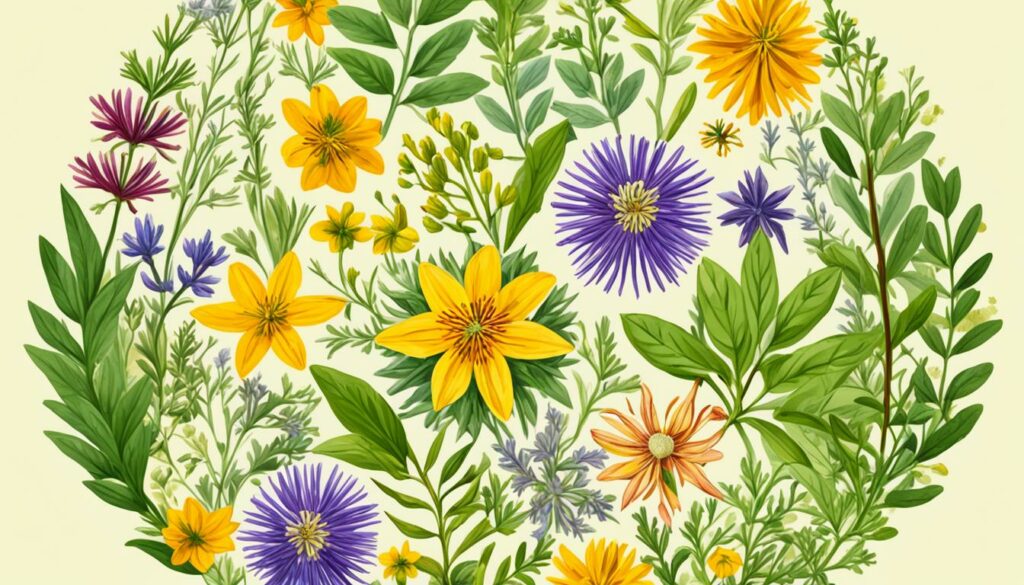Depression is a prevalent mood disorder that affects a significant portion of the population. While conventional treatments like medications and counseling are widely used, some individuals seek alternative methods for relief. One such approach is using herbal remedies for depression. But are these natural remedies truly effective? Can they offer a viable alternative to traditional treatments?
In this article, we delve into the world of herbal remedies for depression and explore their effectiveness and safety. We examine common herbal supplements and their potential benefits, as well as the importance of conventional treatments. So, before you decide on a treatment plan, let’s uncover the truth behind these natural alternatives.
Common Herbal Remedies for Depression
When it comes to managing depression, many individuals turn to herbal remedies as a complementary approach to conventional treatment options. While more research is needed to fully understand their effectiveness and safety, certain herbs and supplements have shown promise in alleviating symptoms of depression. Let’s explore some of the most commonly used herbal remedies for depression:
1. St. John’s Wort
St. John’s Wort is one of the most well-known herbal supplements for depression. Studies suggest that it may be effective in treating mild to moderate depression. However, it’s essential to exercise caution as St. John’s Wort may have potential adverse effects and interactions with other medications. Consulting with a healthcare provider is crucial before incorporating this remedy into your treatment regimen.
2. Ginseng
Ginseng, an herb widely used in traditional Chinese medicine, is another popular option for individuals seeking natural remedies for depression. While research is limited, preliminary studies suggest that ginseng may help improve mood and reduce symptoms of anxiety and depression. It is important to note that ginseng can interact with certain medications, so professional guidance is advised.
3. Chamomile
Known for its calming properties, chamomile is often used as a natural remedy for anxiety and depression. This herb can help promote relaxation and improve sleep, which are crucial aspects of managing depressive symptoms. Incorporating chamomile tea or supplements into your daily routine may provide some relief.
4. Lavender
Lavender, with its soothing aroma, is commonly used in aromatherapy to reduce stress and promote relaxation. Research has suggested that lavender may have antidepressant effects, helping to alleviate symptoms of anxiety and depression. Utilizing lavender essential oil or incorporating lavender tea into your self-care routine may help support your mental well-being.
5. Saffron
Saffron, a spice derived from the Crocus sativus flower, has been used traditionally to improve mood and alleviate symptoms of depression. Preliminary research suggests that saffron may have antidepressant properties, but further studies are needed to establish its efficacy and safety. It’s important to consult with a healthcare provider before using saffron as a natural remedy.
6. SAMe
S-Adenosylmethionine (SAMe) is a compound naturally produced in the body that has been used as a dietary supplement for its potential antidepressant effects. While SAMe may show promise in treating depression, further research is needed to determine its efficacy and safety. Consulting with a healthcare professional is essential before incorporating SAMe into your treatment plan.
7. Omega-3 Fatty Acids
Omega-3 fatty acids, commonly found in fatty fish like salmon and mackerel, have been associated with improved mental health and a reduced risk of depression. The exact mechanism is still being explored, but incorporating omega-3-rich foods or supplements into your diet may provide some benefits for managing depressive symptoms.
8. 5-HTP
5-Hydroxytryptophan (5-HTP) is a compound converted into serotonin in the body, which plays a crucial role in regulating mood. Some studies suggest that 5-HTP may help alleviate symptoms of depression, particularly when combined with other treatments. However, more research is needed to fully understand its effectiveness and safety.
It’s important to note that while herbal remedies offer potential benefits for individuals with depression, they should not replace conventional treatment options. Professional guidance and a comprehensive treatment plan that may include medication and therapy are essential for managing depression effectively.

St. John’s Wort for Depression: Efficacy and Safety
St. John’s wort, a herbal treatment with a long history, has been used for centuries as a natural remedy for depression. Research suggests that it may have a positive effect in treating mild to moderate depression, potentially outperforming a placebo.
However, it is important to note that the long-term effects of St. John’s wort on severe depression are still unclear. Additionally, St. John’s wort can interact with certain medications, including antidepressants, which may reduce their effectiveness. Therefore, it is crucial to exercise caution and not consider St. John’s wort as a substitute for conventional treatment.
In order to make educated decisions about using St. John’s wort for depression, it is recommended to consult with a healthcare provider who can provide further guidance based on individual circumstances.

“St. John’s wort may offer relief for mild to moderate depression, but its use should always be evaluated alongside conventional treatment.”
Other Herbal Remedies and Supplements for Depression
In addition to St. John’s wort, there are several other herbs and supplements that people use for depression. These natural alternatives have shown promise in preliminary studies, but more research is needed to determine their efficacy and safety in treating depression. Let’s explore some of these herbal remedies and supplements:
Ginseng for Depression
Ginseng, a popular adaptogenic herb, has been used in traditional medicine for centuries. Some studies suggest that ginseng may help alleviate symptoms of depression by reducing inflammation and oxidative stress. However, further research is necessary to confirm its effectiveness and optimal dosage.
Chamomile for Depression
Chamomile, well-known for its calming properties, may also have potential benefits for depression. Preliminary research suggests that chamomile extract may help reduce anxiety and improve sleep, which are often associated with depression. However, more studies are required to determine its therapeutic effects in treating depressive symptoms.
Lavender for Depression
Lavender is widely recognized for its soothing aroma and relaxation-inducing properties. Some studies have indicated that lavender essential oil may help reduce anxiety and improve mood, making it a potential complementary treatment for depression. However, more research is needed to determine its effectiveness and appropriate application methods.
Saffron for Depression
Saffron, a vivid spice derived from the crocus flower, has been used in traditional medicine for various purposes. Recent studies have explored its potential antidepressant properties, suggesting that saffron may help relieve symptoms of depression. However, more extensive research is required to evaluate its efficacy and safety as a standalone treatment.
SAMe for Depression
S-adenosyl methionine (SAMe), a naturally occurring compound in the body, is also available as a dietary supplement. SAMe has been studied for its potential effects on depression and has shown promising results in some trials. However, further research is needed to identify its optimal dosage, potential side effects, and long-term safety.
Omega-3 Fatty Acids for Depression
Omega-3 fatty acids, commonly found in fish oil, have been extensively studied for their potential effects on mental health, including depression. Some evidence suggests that omega-3 fatty acids may have benefits in reducing depressive symptoms, particularly in individuals with deficiencies. However, more research is necessary to establish the most effective dosage and identify specific subgroups that may benefit the most.
5-HTP for Depression
5-Hydroxytryptophan (5-HTP) is an amino acid precursor to serotonin, a neurotransmitter involved in mood regulation. Some studies have suggested that 5-HTP may help alleviate symptoms of depression by increasing serotonin levels. However, further research is needed to understand its effectiveness, potential side effects, and interactions with other medications.
While these herbal remedies and supplements may show promise in managing depression, it is essential to consult with a healthcare professional before incorporating them into your treatment plan. Additionally, they should never replace conventional treatments such as therapy and medications. Let’s always prioritize a comprehensive and individualized approach to mental health.

Importance of Conventional Treatment for Depression
While herbal remedies and supplements may provide some relief for depression, it is important to note that they should not be used as a standalone treatment. Conventional treatment, including medication and therapy, is still the recommended approach for managing depression. Herbal remedies can be discussed with a healthcare provider but should never be used as a substitute for professional treatment.
| Conventional Treatment Options for Depression | Description |
|---|---|
| Depression Medication | Prescription antidepressant medications are commonly used to regulate brain chemicals and alleviate depressive symptoms. They help restore the balance of neurotransmitters in the brain, improving mood and overall well-being. |
| Therapy for Depression | Therapy, such as cognitive-behavioral therapy (CBT) or interpersonal therapy (IPT), provides a safe space for individuals to express their emotions, explore underlying causes of depression, and learn coping mechanisms to address negative thought patterns and behavior. |
Conventional treatment options for depression offer a comprehensive and evidence-based approach to managing the condition. Medication helps regulate brain chemistry, while therapy provides valuable emotional support and equips individuals with the necessary skills to address their depressive symptoms.
“Conventional treatment, including medication and therapy, is still the recommended approach for managing depression.”
It is essential to consult with a healthcare provider or mental health professional to discuss the most suitable treatment plan for your specific situation. They can assess the severity of your depression, identify any underlying causes, and determine the appropriate medication and therapy options.
Remember, herbal remedies for depression should always be used in conjunction with, and not as a replacement for, conventional treatment. Working collaboratively with medical professionals ensures the most effective and comprehensive approach to managing depression.

Seeking Help for Depression
If you or someone you know is experiencing signs of depression, it’s important to seek help. Understanding the symptoms can assist in recognizing when it’s time to reach out for assistance. Some common signs of depression include:
- Persistent sadness
- Loss of interest in activities
- Sleep issues
- Changes in appetite
- Trouble concentrating
- Thoughts of death or suicide
If these symptoms are interfering with daily life, it’s crucial to contact a healthcare provider for support. They can provide guidance on appropriate treatment options and help create a plan for managing depression. Remember, seeking help is a sign of strength.
In cases of severe depression or if there are thoughts of suicide, immediate emergency help should be sought. Don’t hesitate to reach out to a helpline or go to the nearest emergency room. Your safety and well-being are of utmost importance.

Conclusion
Herbal remedies can offer some relief for individuals dealing with mild to moderate depression. While more research is necessary to fully comprehend their effectiveness and safety, it is crucial that these remedies are used alongside conventional treatments. Consulting with a healthcare provider before incorporating any herbal remedies into one’s depression management plan is essential.
Although herbal treatments show promise, they should never be a substitute for professional help, particularly in cases of severe or persistent depression. Conventional treatments, including medication and therapy, remain the recommended approach for managing depression.
When considering natural remedies for mood disorders, such as herbal remedies, it is vital to prioritize one’s mental health and consult with medical professionals. Together, healthcare providers and individuals can work to create a comprehensive treatment plan that combines both conventional and holistic approaches to address depression effectively.

